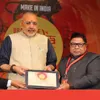This Hyderabad-based mattress brand became a household name over the years, clocks Rs 210 cr turnover
Started in Hyderabad, the Malani family's Centuary Mattresses emerged as a major player in the mattress industry. The brand has 1200 employees and a presence in 3500 retail stores and 400 exclusive brand stores. Here's its story.
In 1988, Bhagwandas Malani mulled over an important business decision. The Hyderabad-based entrepreneur supplied rubberised coir for mattress company Rilaxon, but he’d seen an opportunity to start his mattress brand.
At the time, there weren’t many organised players in the growing market for mattresses. Malani could capitalise on this and start meeting the demand that others couldn’t. It would be the riskier option, but potentially more rewarding.
He also had the option to take the safer way out and continue being a supplier for Rilaxon.
An entrepreneur and businessman at heart, Malani chose the first option. He put faith in everything he’d learned in the trade and started Centuary Mattresses in 1988.
The entrepreneur pumped in Rs 18 lakh to launch the brand and brought his son Purshottam into the fold.
“Being an entrepreneur was in his DNA as he came from a business family. He was the great-grandson of Ramgopal Seth Malani, an eminent entrepreneur in the Hyderabad region during the Nizam's era,” says 35-year-old Uttam Malani, a third generation entrepreneur and the grandson of the Centuary Mattresses founder.
Uttam joined the family business in 2007 and took over as executive director in 2013.

Uttam Malani, Executive Director, Centuary Mattresses
Over the years, Uttam saw Centuary emerge as a major player in the mattress industry. His grandfather’s company grew into a Rs 210 crore turnover mattress brand with 1,200 employees and a presence in 3500 retail stores and 400 exclusive brand stores.
“The parent company Shree Malani Group comprises Centuary Mattresses and Shree Malani Foams. The group had Rs 415 crore turnover in FY 2019, out of which Centuary Mattresses contributed Rs 210 crore,” Uttam clarifies.
Shree Malani Foams manufactures and sells slab stock Polyurethane (PU) foam under the brand name ‘Cenflex’.
Challenges and milestones
Over the past two decades, rising income levels and the growing real estate and hospitality sectors resulted in increased demand for branded mattresses. However, increasing production to meet demand is never easy for a brand - even for someone like Malani, who have vast experience in the industry.
“The biggest initial challenge was to cope with the huge demand we got in response to our launch. Over the years, we faced constant stress in terms of expansion of the team and the manufacturing capacities,” Uttam says.
He recalls a time when some brands started using Expanded Polyethylene Foam (EPE) in their products to lower costs. But Centuary didn’t follow suit - EPE is harmful for use in a mattress, Uttam says, and the company decided to stay away from using EPE despite short-term sales being affected.
Instead, it stuck to its guns and did what it knew best: manufacture rubberised coir mattresses, and innovate on new products.

Centuary Mattresses' signature collection
It grew into one of the largest exporters of rubberised coir in India, and became one of the first Indian mattress manufacturers to hold the ISO 9001-2008 certification for its quality management system, Uttam says.
“Now, we have the ISO 9001 - 2015 certification as well. In 2018, we achieved the milestone of manufacturing five million mattresses. We also ventured into the baby mattress and luxury mattress categories,” he adds.
The brand has been trying to stay abreast of the increasing trend of buying mattresses online. The ease and comfort of being able to compare mattress types, designs, prices, and delivery options online is making people shift towards online shopping.
“For five years, we have been visualising the changing trends and implementing digital strategies. Today, we are strong on digital, OTT and ecommerce platforms. Besides our physical stores, customers can buy our mattresses on our website and on Amazon, Flipkart, Shopclues, Fabmart, etc,” Uttam says.
The contribution of ecommerce is less than five percent of Centuary’s category sales. The company estimates online influence at around 45 percent, and expects this to help augment the category and scale it upto 25 percent of category sales in the next three years.
Market overview and opportunities
The Indian mattress market is expected to grow at a CAGR of 10 percent and is enroute to reach $2.5 billion by 2022, according to RedSeer data. Besides Centuary, the key players in the organised mattress market are Kurl-on, Sleepwell, Duroflex, Peps Industries and Springfit.
Uttam believes the penetration of branded mattresses in Indian households is still below 10 percent, and this presents vast opportunities for Centuary to indulge in healthy competition. As customers increasingly look to purchase branded and high quality mattresses, the market share of unorganised players is expected to drop.

The Centuary Mattresses factory in Hyderabad
“Nowadays, consumers are more inclined to the organised sector as they are more brand conscious and are willing to spend more for the right product. Keeping that in mind, we have different price ranges to fulfill consumer needs. We have a range from Rs 8,000 to Rs 80,000 ,” Uttam says.
Centuary’s average selling price point for mattresses is around Rs 15,000.
“Our target customers are the Socio Economics Class (SEC) A+, A and B of the age group of 25 to 45 years. In addition, we also have customers from the hospitality industry and government departments,” he says.
In the near future, Centuary aims to meet rising demand through aggressively expanding its product portfolio and range. It makes mattresses at three manufacturing plants: two in Telangana and one in Orissa. The total production capacity of these three plants is six lakh mattresses per year, Uttam says.
He adds that the plant’s efficient production setup keeps the brand ahead of its competition and helps it cater to over five million households in 18 states.



![[2020 Outlook] Top 5 emerging trends impacting the Indian mattress market](https://images.yourstory.com/cs/21/0a385fc03e6011e999df3d1594bbde2c/mattresstrend-1578479410728.png?fm=png&auto=format&h=100&w=100&crop=entropy&fit=crop)





